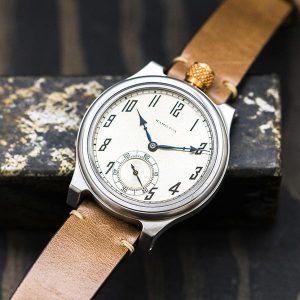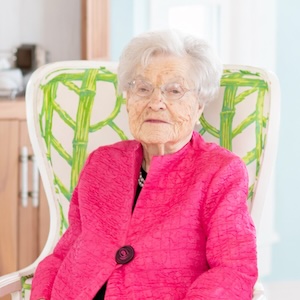
A New York District Court this month gave Vortic Watch Co. its latest legal win against a division of the Swatch Group. The lawsuit, which Vortic’s cofounders have been fighting since 2015, challenged the Fort Collins, Colorado–based startup’s efforts to sell upcycled Hamilton-trademarked pocket watches as wristwatches.
Cofounder R.T. Custer is celebrating the victory, but not for long, he says. He has bigger projects in mind: paying back the six figures in legal fees the court case racked up, as well as hiring more people at Vortic to create the watches collectors are snapping up as soon as they go on sale.
To the point: On Tuesday, Vortic put one of its Hamilton upcycled wristwatches on its website for sale for the first time since the lawsuit was filed. The Lancaster 103 sold out on the first day it was available, at a cost of $2,495. It was a bittersweet moment for Custer and his eight-person company.
“We’re doing what they didn’t want us to do,” he says.
On the plus side, Vortic will survive and likely thrive, based on its first years of sales and public response, Custer says. On the negative side, he will always wonder what this beginning part of his entrepreneurship journey might have been like if he hadn’t had a 850-pound gorilla on his back nearly the entire time.

Custer and his cofounder, Tyler Wolfe, founded Vortic in 2013. At the time, Custer was a student at Penn State University, in the state where he grew up. His father still lives there, practically in the shadow of where the Hamilton Watch Co. factory stood, Custer says. His mother died of cancer in 2020, another reason why the Swatch lawsuit was exhausting.
The idea behind Vortic was to restore and preserve antique American pocket watches, carefully turning them into wristwatches that honor the past while having the latest in watch craftsmanship behind the glass, Custer says.
The trademark battle began in 2015, when the world’s largest watch company heard about the pocket watches from its Hamilton brand that Vortic was using in its upcycling business. The Swatch Group saw it as a trademark violation; Vortic saw it as a legal use of Hamilton parts to make a new watch.
In a Sept. 14 opinion, a panel of federal judges for the U.S. Court of Appeals for the 2nd Circuit ruled in favor of Vortic. The judges affirmed a September 2020 New York District Court ruling on the case on all counts.
“The court’s decision reaffirms something that the law has long made clear: Trademark law is not a sword to be used indiscriminately,” Jin-Ho King, one of Vortic’s attorneys, said in a statement. “There must be a likelihood of consumer confusion. Vortic Watch Co. expends significant effort to fully educate consumers about its products, and [the] outcome confirms the meaningfulness of those efforts.”

When asked for comment, Swatch Group responded via email: “Thank you for your message and for your interest. We are not going to comment [on] this case.”
Custer, who estimates the Swatch Group spent in excess of seven figures in legal fees on the case, says he isn’t surprised by this response. “That’s been their statement for six years, unfortunately.”
Custer says he researched the legal issues around upcycling and his particular business idea before he and Wolfe started Vortic, and continued that research even while running the business. Interestingly, Custer says, Hamilton pocket watches only accounted for about 15% of Vortic’s business, and the company uses other, larger watchmakers in its work as well. Yet only Swatch Group took Vortic to court.
Custer says the lawsuit felt like those first months of the coronavirus: a massive burden. Mysterious. Scary. Here he was, co-owner of a watch company that makes about 400 watches annually, up against a business that might make 400 watches an hour. It felt overwhelming.
“To them, it’s business as usual,” Custer says. “To me, it’s life-changing in terms of this huge unknown, and that’s why I relate it to the pandemic,” Custer says. “We had no idea what to do. For a while, I thought I was going to lose everything.… I just turned 30. [Fighting this lawsuit] has been a decade of my life.”
The suit is now over, unless Swatch Group appeals to the U.S. Supreme Court. Custer admits that, in a way, he wants that appeal to happen—it would settle this issue once and for all for upcycling-style companies. However, he’d really rather focus on his future: Vortic is now renovating an 8,000-square-foot factory and workshop in Fort Collins, Colo.; when it’s completed, the company will open its doors to other entrepreneurs and watch fanatics alike. And he wants to go on a hiring spree as soon as he pays off his legal bills.
“Karma always wins,” Custer says. “We’re just getting started.”
Top: R.T. Custer, cofounder of Vortic Watch Co., stands victorious in front of the federal courthouse in New York City. (All photos courtesy of Vortic Watch Co.)
- Subscribe to the JCK News Daily
- Subscribe to the JCK Special Report
- Follow JCK on Instagram: @jckmagazine
- Follow JCK on X: @jckmagazine
- Follow JCK on Facebook: @jckmagazine






